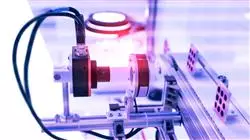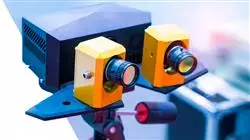University certificate
The world's largest faculty of information technology”
Introduction to the Program
Specialize in artificial vision applied to Robotics and progress in your professional career with this Postgraduate diploma"

Far from science fiction, this program aimed at Computer Science professionals is oriented to provide all the necessary knowledge for the student to be able to project any idea to be developed in Artificial Intelligence or to work in Robotics projects, especially in the field of visual perception systems.
In this way, the teaching team specialized in this area will guide the students through the algorithmic bases that support its operation, its applications, advantages and limitations. To do this, during the 6 months of this online Postgraduate diploma, a theoretical-practical approach will be applied in which, through examples, the students will find environments with robots, but without losing sight of the relevance to understand the machine learning techniques to be used.
Although artificial vision is one of the most complex fields of Robotics, the multimedia material offered by this program will facilitate its learning. Thus, students will be able to acquire the main vision techniques based on learning systems, particularly the use of neural networks, which have revolutionized the way in which machine vision is used today. Likewise, in this program the student will learn the most advanced tools to be able to develop in the field of artificial vision for Robotics, both at a theoretical and practical level.
An excellent opportunity for graduates who wish to progress in their professional field under the guidance of the best specialists and with quality teaching, which allows access to all the content from the first day and a Relearning system, based on the reiteration of content, which in turn facilitates learning and knowledge consolidation.
Join a 100% online program and apply advanced Artificial Intelligence techniques on Intelligent Agents in your projects”
This Postgraduate diploma in Robot Visual Perception Systems with Machine Learning contains the most complete and up-to-date program on the market. The most important features include:
- Development of case studies presented by experts in robotic engineering
- The graphic, schematic, and practical contents which provide scientific and practical information on the disciplines that are essential for professional practice
- Practical exercises where self-assessment can be used to improve learning
- Its special emphasis on innovative methodologies
- Theoretical lessons, questions to the expert, debate forums on controversial topics, and individual reflection assignments
- Content that is accessible from any fixed or portable device with an Internet connection
Unleash your full potential in this Postgraduate diploma and learn in a simple way to identify the new fields of application of generative neural networks”
The program’s teaching staff includes professionals from the sector who contribute their work experience to this educational program, as well as renowned specialists from leading societies and prestigious universities.
Its multimedia content, developed with the latest educational technology, will allow the professional a situated and contextual learning, that is, a simulated environment that will provide an immersive education programmed to prepare in real situations.
This program is designed around Problem-Based Learning, whereby the professionals must try to solve the different professional practice situations that arise throughout the program. This will be done with the help of an innovative system of interactive videos made by renowned experts.
This Postgraduate diploma will allow you to reach a high level of mastery of the algorithms used in the creation of robots"

An excellent opportunity for you to implement your projects in the area of Robotics"
Why study at TECH?
TECH is the world’s largest online university. With an impressive catalog of more than 14,000 university programs available in 11 languages, it is positioned as a leader in employability, with a 99% job placement rate. In addition, it relies on an enormous faculty of more than 6,000 professors of the highest international renown.

Study at the world's largest online university and guarantee your professional success. The future starts at TECH”
The world’s best online university according to FORBES
The prestigious Forbes magazine, specialized in business and finance, has highlighted TECH as “the world's best online university” This is what they have recently stated in an article in their digital edition in which they echo the success story of this institution, “thanks to the academic offer it provides, the selection of its teaching staff, and an innovative learning method aimed at educating the professionals of the future”
A revolutionary study method, a cutting-edge faculty and a practical focus: the key to TECH's success.
The most complete study plans on the university scene
TECH offers the most complete study plans on the university scene, with syllabuses that cover fundamental concepts and, at the same time, the main scientific advances in their specific scientific areas. In addition, these programs are continuously being updated to guarantee students the academic vanguard and the most in-demand professional skills. In this way, the university's qualifications provide its graduates with a significant advantage to propel their careers to success.
TECH offers the most comprehensive and intensive study plans on the current university scene.
A world-class teaching staff
TECH's teaching staff is made up of more than 6,000 professors with the highest international recognition. Professors, researchers and top executives of multinational companies, including Isaiah Covington, performance coach of the Boston Celtics; Magda Romanska, principal investigator at Harvard MetaLAB; Ignacio Wistumba, chairman of the department of translational molecular pathology at MD Anderson Cancer Center; and D.W. Pine, creative director of TIME magazine, among others.
Internationally renowned experts, specialized in different branches of Health, Technology, Communication and Business, form part of the TECH faculty.
A unique learning method
TECH is the first university to use Relearning in all its programs. It is the best online learning methodology, accredited with international teaching quality certifications, provided by prestigious educational agencies. In addition, this disruptive educational model is complemented with the “Case Method”, thereby setting up a unique online teaching strategy. Innovative teaching resources are also implemented, including detailed videos, infographics and interactive summaries.
TECH combines Relearning and the Case Method in all its university programs to guarantee excellent theoretical and practical learning, studying whenever and wherever you want.
The world's largest online university
TECH is the world’s largest online university. We are the largest educational institution, with the best and widest online educational catalog, one hundred percent online and covering the vast majority of areas of knowledge. We offer a large selection of our own degrees and accredited online undergraduate and postgraduate degrees. In total, more than 14,000 university degrees, in eleven different languages, make us the largest educational largest in the world.
TECH has the world's most extensive catalog of academic and official programs, available in more than 11 languages.
Google Premier Partner
The American technology giant has awarded TECH the Google Google Premier Partner badge. This award, which is only available to 3% of the world's companies, highlights the efficient, flexible and tailored experience that this university provides to students. The recognition as a Google Premier Partner not only accredits the maximum rigor, performance and investment in TECH's digital infrastructures, but also places this university as one of the world's leading technology companies.
Google has positioned TECH in the top 3% of the world's most important technology companies by awarding it its Google Premier Partner badge.
The official online university of the NBA
TECH is the official online university of the NBA. Thanks to our agreement with the biggest league in basketball, we offer our students exclusive university programs, as well as a wide variety of educational resources focused on the business of the league and other areas of the sports industry. Each program is made up of a uniquely designed syllabus and features exceptional guest hosts: professionals with a distinguished sports background who will offer their expertise on the most relevant topics.
TECH has been selected by the NBA, the world's top basketball league, as its official online university.
The top-rated university by its students
Students have positioned TECH as the world's top-rated university on the main review websites, with a highest rating of 4.9 out of 5, obtained from more than 1,000 reviews. These results consolidate TECH as the benchmark university institution at an international level, reflecting the excellence and positive impact of its educational model.” reflecting the excellence and positive impact of its educational model.”
TECH is the world’s top-rated university by its students.
Leaders in employability
TECH has managed to become the leading university in employability. 99% of its students obtain jobs in the academic field they have studied, within one year of completing any of the university's programs. A similar number achieve immediate career enhancement. All this thanks to a study methodology that bases its effectiveness on the acquisition of practical skills, which are absolutely necessary for professional development.
99% of TECH graduates find a job within a year of completing their studies.
Postgraduate Diploma in Robot Visual Perception Systems with Machine Learning
Robotics has become one of the most promising areas today, with a huge potential to revolutionize different sectors. The ability of robots to perform tasks autonomously, without the need for human intervention, is one of the reasons why they are increasingly being used in industry and everyday life. In this context, the field of visual perception systems with machine learning is essential for improving the efficiency of robots, as well as for achieving greater accuracy in decision-making. Therefore, experts in this field are highly demanded by technology companies. Consequently, this academic institution has designed the Postgraduate Diploma in Robot Visual Perception Systems with Machine Learning, which will specialize you in this field to increase your career prospects.
Specialize in Robot Visual Perception Systems with Machine Learning through a 100% online methodology
The Postgraduate Diploma in Robot Visual Perception Systems with Machine Learning will enable you to learn about unsupervised learning methods applied to computer vision, delve into the intricacies of deep neural networks or identify learning techniques for localization and mapping in Mobile Robotics. This program is taught by a prestigious teaching staff, made up of the best engineers specialized in the field of Robotics, who will be responsible for providing you with the most cutting-edge and up-to-date knowledge in this sector.







